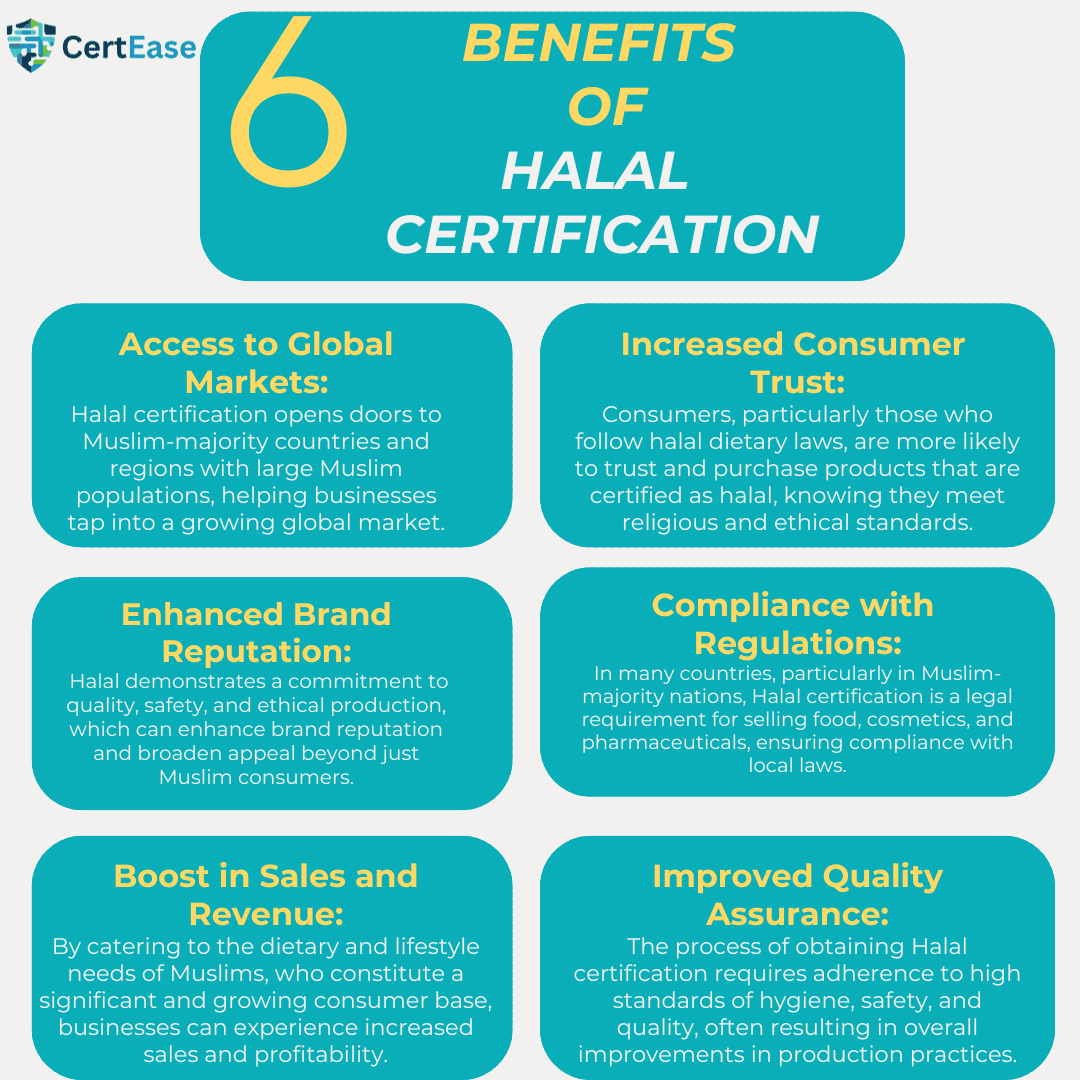Halal Certification in Philippines
CertEase offers Halal Certification in Philippines to help organizations comply with Islamic dietary laws and ensure the highest standards of product quality. Our services include a comprehensive review of ingredients, production processes, and facilities to ensure that your products meet Halal requirements. We provide expert guidance throughout the certification process, helping you address potential risks and maintain ongoing compliance. With CertEase, you can expand your market, build consumer trust, and demonstrate a strong commitment to providing Halal-certified products that meet global standards.
Looking For Certification?
Have queries?
Halal certification in Philippines is an essential consideration for businesses in the food, beverage, and manufacturing sectors, especially in cities like Manila, Quezon City, Cebu City, Davao City, Makati, Zamboanga City, Baguio City. Obtaining Halal certification ensures that products comply with Islamic dietary laws and standards, making them permissible for Muslim consumers. By achieving Halal certification, companies in Philippines can enhance their marketability and access key markets with significant Muslim populations, such as the Middle East, Southeast Asia, and North Africa.
What is Halal Certification in Philippines?
Halal certification in Philippines is an official recognition that a product, service, or facility complies with Islamic dietary laws and practices. Derived from the Arabic word “Halal,” meaning “permissible,” this certification ensures that the production, ingredients, and handling processes align with Islamic law.
Halal certification is not limited to food products; it also applies to cosmetics, pharmaceuticals, and other consumables. With increasing demand from Muslim consumers worldwide, obtaining this certification can significantly enhance a brand’s credibility and market reach.

Please fill out the details below, and one of our executives will be in touch with you shortly!
Benefits of Halal Certification in Philippines
- Access to New Markets: Countries requiring Halal certification for import, such as Malaysia, Indonesia, and Saudi Arabia, represent lucrative markets for certified products.
- Consumer Trust: Muslim consumers actively seek products with credible Halal certification labels, boosting brand loyalty.
- Export Opportunities: Businesses in Philippines looking to expand internationally will find Halal certification for export invaluable in meeting import requirements.
- Diverse Applications: From Halal certification for restaurants in Philippines to Halal certification for pharmaceuticals in Philippines, businesses across sectors benefit from increased inclusivity and compliance.
Halal Certification vs. Kosher Certification
Although both Halal in Philippines and Kosher certifications in Philippines cater to specific dietary laws, they are distinct in their requirements:
- Halal Certification: Ensures adherence to Islamic laws, including no alcohol, pork, or improperly slaughtered animals.
- Kosher Certification: Complies with Jewish dietary laws, focusing on separation of meat and dairy and additional processing standards.
While both certifications in Philippines promote ethical practices, businesses must understand their unique requirements when targeting specific demographics.
Industries and Products Requiring Halal Certification in Philippines
- Halal Certification for Food Products in Philippines: Essential for meat, dairy, snacks, and beverages.
- Halal Certification for Cosmetics in Philippines: Covers items like lipsticks, lotions, and skincare, ensuring no animal-derived or alcohol-based ingredients.
- Halal Certification for Pharmaceuticals in Philippines: Verifies that medications, supplements, and medical devices meet Islamic guidelines.
How to Get Halal Certification in Philippines?
Obtaining Halal certification in Philippines involves a multi-step process:
- Application Submission: Fill out the Halal certification application in Philippines with the relevant details about your product or facility.
- Inspection: Certification bodies conduct an audit of ingredients, processes, and facilities.
- Compliance Verification: Ensure all practices meet Halal requirements in Philippines.
- Certification Issuance: Upon approval, the organization grants the certificate, which is valid for a specified period.
Kosher Certification for Restaurants and Manufacturers in Philippines
Restaurants and manufacturers in Philippines have unique needs when pursuing kosher certification. Restaurants must ensure their entire kitchen operation complies with kosher laws, while manufacturers need to focus on ingredient sourcing and production lines.
Halal Certification Requirements in Philippines
Requirements differ based on the product or service being certified in Philippines. Common criteria include:
- No use of prohibited ingredients like pork or alcohol.
- Ethical sourcing and humane slaughter of animals.
- Dedicated equipment to prevent cross-contamination.
Cost of Halal Certification in Philippines
The cost of Halal certification in Philippines varies based on the certifying body, the type of product, and the complexity of the audit, depending on the scope.
Halal Certification for Export in Philippines
Businesses in Philippines aiming to export to Muslim-majority countries must obtain Halal certification to comply with import regulations. This certification acts as a passport for products entering global markets.
Halal Certification Process in Philippines
The process typically involves the following steps:
- Initial Consultation: Understanding the requirements for your industry in Philippines.
- Document Submission: Providing details about the product, ingredients, and manufacturing process.
- On-Site Audit: Inspection by a certification body to verify compliance.
- Approval and Certification: Receiving the certification and label rights upon meeting all criteria.
Halal certification in Philippines is more than a compliance measure—it’s a strategic investment for businesses looking to expand their reach, build trust, and cater to a growing global market. Whether you’re in the food, cosmetics, or pharmaceutical industry, especially in cities like Manila, Quezon City, Cebu City, Davao City, Makati, Zamboanga City, Baguio City, obtaining Halal certification ensures your products meet the highest standards of quality and inclusivity.
How CertEase Can Help?
CertEase’s team of expert consultants offers tailored solutions for businesses across the food supply chain. From initial gap analysis to full implementation and certification, we guide you through each step of the food safety certification process to ensure that your business is fully compliant and operationally efficient.

Protect Your Consumers and Business Today
Food safety is not just a legal requirement but a vital part of building a sustainable and trustworthy brand. Contact CertEase today to learn how we can help you achieve food safety excellence through our range of certification services.

10+
Years of Experience
Why Should You Choose Us?
You’re partnering with a company dedicated to making certification simple, efficient, and effective for your business.
- Expertise Across Industries – With deep knowledge of international standards like ISO, RoHS, CE Marking, and more, we provide tailored solutions for various sectors including healthcare, manufacturing, IT, and services.
- Comprehensive Support – From consultation and training to audits and certification, our end-to-end services ensure a smooth, hassle-free certification process.
- Global Reach – We serve clients worldwide, ensuring compliance with regional and international regulations, no matter where your business operates.
- Proven Track Record – Our team’s success in securing certifications for organizations across the globe speaks to our commitment to quality and client satisfaction.
- Customized Approach – Every business is unique, and we offer personalized services that cater to your specific certification needs, ensuring efficiency and optimal results.
- Ongoing Guidance – Our support doesn’t end with certification; we provide ongoing guidance to help maintain compliance and continuously improve your processes.
Email:
Contact@certease.com
Open Hours:
Mon-Sat: 9am - 6pm
